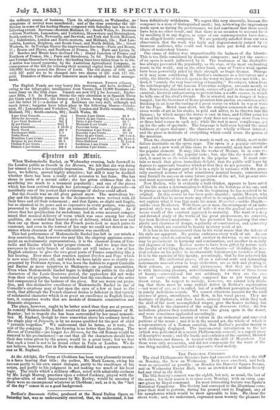C4ratrro nit Muir.
When Mademoiselle Rachel, on Wednesday evening, bade farewell to the London public as Camille in Les Boraces, we felt that she was doing her utmost to leave a favourable impression. The performances this year have, we believe, proved highly attractive; but still it may be doubted whether there has been a really solid accession to her fame. She has shone in parts of a second order ; she has given evidence that she is sacrificing too much to a transient popularity ; and one of the pieces which has been revived through her patronage—Louise de Lignerolles—is manifestly one of the poorest that a rummage of shelves could afford. But the Camille was an old glory gained anew. The marvellous by- play and the infinite nuances in the declamation were revived with all their force and all their refinement ; and that figure, so slight and fragile, but so classical in its poses and so expressive in every gesture, was again presented to the public eye like an animated relic of antiquity. As if aware that her predilection for melodrama had in some measure compro- mised that musical delivery of verse which was once among her chief qualities, she avoided that hurried style of delivery, which has now and then cut up those metres that the French poets took so much pains to construct, and even in the torrent of her rage we could not detect an in- stance where clearness of verse-articulation was sacrificed.
This last performance of Mademoiselle Rachel has left in our minds a deep conviction, that however she may like the claptrap applause conse- quent on melodramatic representations, it is the classical drama of Cor- neille and Racine which is her proper element. And we hope that her successes in this early branch of dramatic art will induce a few of her English admirers to give the two great poets of France something like a fair hearing. Ever since that reaction against Dryden and Pope which is now some fifty years old, and which we have lately seen so stoutly re- presented by Professor Aytoun, it has been the fashion to regard Corneille and Racine as mere negatives to Shakspere—as poetical nonentities. Even when Mademoiselle Rachel began to delight the public in the chief characters of the Louis Quatorze period, the applauders did .not wake from their old prejudice, but maintained that the excellence of the artist bad compensated for the badness of the piece. But use wears out preju- dice, and this distinctive excellence of Mademoiselle Rachel in one of Corneille's creations may at last open the eyes of a few at least to the truth that although the French classical drama is deficient in that variety of substantial character which is so great an excellence in English litera- ture it comprises works that are models of dramatic construction and dramatic eloquence. The plays, however, ought to be better acted than they are at present. In comedy Mademoiselle Rachel received the powerful assistance of M. Begnier ; but in tragedy she has been surrounded by her usual nonenti- ties. M. Raphael, though he rises somewhat above his ordinary level in the single play of Polyeucte, is by no means qualified for the post of chief "juvenile tragedian." We understand that he farms, as it were, the rest of the company. If so, his farming is no better than his acting. The Horace of Corneille—(no longer Les Iforaees, for the old Roman would be restored to his preeminence)—so cast that all the characters should have their due value given by the actors, would be a great treat; but we fear that such a treat is not to be .found either in Paris or. London. We do not believe, however, that in Paris we should find such a premier amour- eux as M. Raphael.


























 Previous page
Previous page